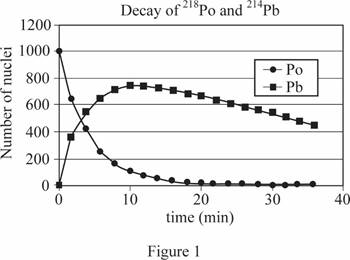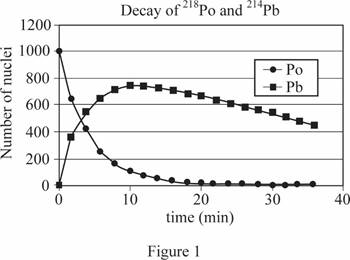
Concept explainers
(a)
The differential equation that defines the number of daughter nucleus.
(a)
Answer to Problem 18P
The daughter nucleus satisfies the differential equation is
Explanation of Solution
Let
Write the expression for decay rate
Here,
Write the expression for rate of change of the daughter nuclei
Here,
The rate of decay of the parent nucleus is same as the rate of production of the daughter nuclei.
Substitute
Conclusion:
Substitute
Thus, the daughter nucleus satisfies the differential equation is
(b)
The solution to the above differential equation using the verification by substitution method.
(b)
Answer to Problem 18P
Explanation of Solution
Write the expression for trail solution
Differentiate the above equation with respect to
Multiply equation (V) by
Write the expression for
Conclusion:
Solve (VII) further
Substitute (VIII) in the above equation and rearrange.
Thus,
(c)
The number of
(c)
Answer to Problem 18P
The number of

Explanation of Solution
Write the expression for decay constant
Here,
Substitute
Substitute
Substitute
Substitute
Conclusion:
Using expression (X) and (XI), table the number of
| 0 | 1000 | 0 |
| 2 | 445 | 350 |
| 4 | 408 | 557 |
| 6 | 261 | 673 |
| 8 | 167 | 730 |
| 10 | 107 | 752 |
| 12 | 68.3 | 751 |
| 14 | 43.7 | 737 |
| 16 | 27.9 | 715 |
| 18 | 17.9 | 689 |
| 20 | 11.4 | 660 |
| 22 | 7.30 | 631 |
| 24 | 4.67 | 602 |
| 26 | 2.99 | 573 |
| 28 | 1.91 | 545 |
| 30 | 1.22 | 519 |
| 32 | 0.781 | 493 |
| 34 | 0.499 | 468 |
| 36 | 0.319 | 445 |
Using the above data in the table construct the graph

Thus, the above graph shows the number of nuclei as a function of time.
(d)
The instant when the number of
(d)
Answer to Problem 18P
The number of
Explanation of Solution
From the above graph, the
(e)
An expression for maximum number of
(e)
Answer to Problem 18P
The time for maximum
Explanation of Solution
Equate (VI) to zero to find the maximum
Conclusion:
Simplify and rearrange for
Here,
Thus, time for maximum
(f)
The instant when the number of
(f)
Answer to Problem 18P
The time when the number of
Explanation of Solution
The time for maximum
Conclusion:
Substitute
Thus, the time when the number of
Want to see more full solutions like this?
Chapter 43 Solutions
Physics for Scientists and Engineers with Modern Physics
- Can someone help mearrow_forwardCan someone help me with this thank youarrow_forward(a) For a spherical capacitor with inner radius a and outer radius b, we have the following for the capacitance. ab C = k₂(b- a) 0.0695 m 0.145 m (8.99 × 10º N · m²/c²)( [0.145 m- 0.0695 m × 10-11 F = PF IIarrow_forward
- A pendulum bob A (0.5 kg) is given an initialspeed of vA = 4 m/s when the chord ishorizontal. It then hits a stationary block B (1kg) which then slides to a maximum distanced before it stops. Determine the value of d.The coefficient of static friction between theblock and the plane is μk = 0.2. The coefficientof restitution between A and B is e = 0.8.Ans: d=1.0034 marrow_forwardFigure 29-43 Problem 12. ••13 In Fig. 29-44, point P₁ is at distance R = 13.1 cm on the perpendicular bisector of a straight wire of length L = 18.0 cm carrying current i = 58.2 mA. (Note that the wire is not long.) What is the magnitude of the magnetic field at P₁ due to i? P2° R R Larrow_forwardCheckpoint 1 The figure shows the current i in a single-loop circuit with a battery B and a resistance R (and wires of neg- ligible resistance). (a) Should the emf arrow at B be drawn pointing leftward or rightward? At points a, B C R b, and c, rank (b) the magnitude of the current, (c) the electric potential, and (d) the electric potential energy of the charge carriers, greatest first.arrow_forward
 Modern PhysicsPhysicsISBN:9781111794378Author:Raymond A. Serway, Clement J. Moses, Curt A. MoyerPublisher:Cengage Learning
Modern PhysicsPhysicsISBN:9781111794378Author:Raymond A. Serway, Clement J. Moses, Curt A. MoyerPublisher:Cengage Learning Principles of Physics: A Calculus-Based TextPhysicsISBN:9781133104261Author:Raymond A. Serway, John W. JewettPublisher:Cengage Learning
Principles of Physics: A Calculus-Based TextPhysicsISBN:9781133104261Author:Raymond A. Serway, John W. JewettPublisher:Cengage Learning Physics for Scientists and Engineers with Modern ...PhysicsISBN:9781337553292Author:Raymond A. Serway, John W. JewettPublisher:Cengage Learning
Physics for Scientists and Engineers with Modern ...PhysicsISBN:9781337553292Author:Raymond A. Serway, John W. JewettPublisher:Cengage Learning University Physics Volume 3PhysicsISBN:9781938168185Author:William Moebs, Jeff SannyPublisher:OpenStax
University Physics Volume 3PhysicsISBN:9781938168185Author:William Moebs, Jeff SannyPublisher:OpenStax College PhysicsPhysicsISBN:9781285737027Author:Raymond A. Serway, Chris VuillePublisher:Cengage Learning
College PhysicsPhysicsISBN:9781285737027Author:Raymond A. Serway, Chris VuillePublisher:Cengage Learning College PhysicsPhysicsISBN:9781938168000Author:Paul Peter Urone, Roger HinrichsPublisher:OpenStax College
College PhysicsPhysicsISBN:9781938168000Author:Paul Peter Urone, Roger HinrichsPublisher:OpenStax College





